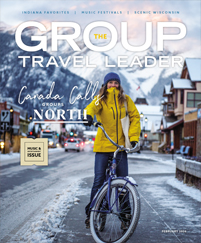Whether they’re fearful of artificial intelligence’s rapid rise or turned off by tech in general, many travel industry professionals have yet to explore its potential. But this buzzworthy tech also opens a lot of doors for those in the travel industry.
For small tour operators with a lot on their plates, AI can help outsource their least favorite parts of the job and increase productivity. Larger tour companies may see even more benefit, as AI can help them analyze the large amounts of data they collect. But how should tour operators, travel agents and other trip planners begin using this powerful tool?
We talked to three AI experts in the travel space. Here’s what they had to say about using artificial intelligence to plan group travel.
How AI Can Help
AI can make life easier for tour operators, travel agents and other travel business owners in a variety of ways. Here are just a few of the many ways travel professionals can make smart use of AI to reduce tedium and boost creativity.
Marketing
Marketing is one of the most common use cases for AI. Many people start with social media because a lot of platforms already come equipped with AI assistance for generating posts. International tour director and tech enthusiast Micky Kandola said travel planners can use AI to easily generate social media copy. Or they can use the AI features on sites like Canva or Adobe Express to create branded infographics and images.
But its utility doesn’t stop with content creation. It can also help tour operators on the strategic side by performing tasks like creating a social media strategy, performing audits on current social media pages or even analyzing posts for audience engagement. It can create pro forma documents like press releases or customize marketing emails to apply to a different segment of a tour operator’s audience.
Popular Platforms: ChatGPT, Jasper, Copy.ai
Try This: Ask AI to create an engaging social media post advertising your upcoming trips for Facebook, Instagram and LinkedIn using relevant hashtags.
Customer Feedback and Questions
Some artificial intelligence tools can help travel professionals forge strong relationships with customers. According to Dan Christian, founder and host of Travel Trends Podcast, one popular application is using an AI chatbot to answer frequently asked questions on a travel company’s website. These bots can comb through website content to answer simple questions while directing more complex questions to the tour operator. There are countless platforms that offer AI chatbots, many of which can be plugged into existing websites with easy-to-use integrations.
AI can also make improvements to a business based on customer feedback, thanks to its ability to sort and analyze data. If customers answer post-trip surveys, trip leaders can input this data and ask AI to generalize the survey results, create charts or other graphics, and even make suggestions for improving their business model.
Popular Platforms: Intercom, Zapier Chatbots, ChatGPT, HubSpot
Try This: Ask AI to analyze the post-trip survey data from your most recent trip to compile a list of what customers liked and didn’t like.
Research/Product Creation
In many ways, AI is just a fancy search engine, capable of answering multiple complex questions at the same time. That’s what makes it such an excellent tool for research and generating ideas for travel products. Travel planners can ask for everything from a destination’s best-rated restaurants to a two-day itinerary for that destination. Kandola advised that AI is also great at summarizing. Travel planners can upload everything from industry reports on tourism to destination guides and have AI give them a comprehensive list of the highlights.
Tour operators can also use AI to adapt their current products to better suit a different segment of their audience. If they have an adult-friendly trip but want to make it appeal to student groups, they could upload the itinerary and ask AI to make changes that will make it suitable for teenagers.
Popular Platforms: ChatGPT, Perplexity
Try This: Upload a PDF of a destination’s visitors guide and ask AI to generate talking points for the motorcoach ride to that destination.
Back-Office Tasks
Managing the administrative tasks of a business can be time-consuming and tedious, but Janette Roush, senior vice president of innovation and chief AI officer at Brand USA, said AI can assist with everything from accounting and finances to bookkeeping. AI in bookkeeping software can record and sort transactions, track expenses and predict cash flow based on a business’s past performance. It can also automatically record and analyze financial data and generate reports or internal memos.
If they’re looking to expand their business, travel business owners can use AI to help create job descriptions and vet resumes against these descriptions. It can also help them create training or onboarding materials, from contracts to employee handbooks.
Popular Platforms: QuickBooks, Xero, Workable, Breezy HR, ChatGPT
Try This: Ask AI to generate a job description to post on a job-seeking site for tour guides to lead your trips.
Everyday Workflow
AI can act as a virtual assistant to help users manage their time and off-load menial tasks like answering emails, taking notes during meetings and scheduling appointments. Many AI platforms integrate directly with email accounts to automatically create calendar items or tasks from the body text of incoming emails. Some AI assistants can sit in during meetings and generate transcriptions and summaries of what was discussed, as well as send action items to the other parties involved. Some smart scheduling tools can even help business owners prioritize their list of tasks for the day.
Popular Platforms: Notion, Microsoft Copilot, Clockwise, Otter.ai
Try This: Use an AI assistant to transcribe and summarize your meetings.
How AI Can’t Help
Just because AI can do something doesn’t mean it should. Here are some use cases that travel technology experts recommend avoiding — at least for now.
Writing Long-Form Content
Many people have turned to AI for help with writing projects, and it’s easy to understand why. It generates large blocks of content almost instantly, but that doesn’t mean travel planners should use it for every type of writing. AI writing tends be repetitive, generic and predictable, and it frequently contains factual inaccuracies or exaggerations.
While it can be helpful for developing ideas, creating social media copy or outlining writing, nobody wants their audience to know them for unoriginal, uninspired content. Roush recommended relying on human professionals for anything long-form and public-facing to ensure its quality, whether that’s large chunks of website copy, blog posts or articles about destinations. If writing isn’t their strong suit, planners can still use AI tools to help catch errors and enhance their copy.
Generating Destination Images
These days, it’s a common experience to look at a photo and realize something is off, like extra fingers or missing limbs. We used to assume these mistakes were by-products of bad photoshop (and to be fair, they might still be). But strange photo errors can increasingly be attributed to AI, which sometimes struggles to keep images accurate to life.
On the flip side of things, some AI photography is too good to be true. Photography and videography with enhanced colors and even fictional places can tantalize potential customers, but it raises a few ethical concerns, too. Relying on AI imagery in travel marketing materials or other content can add up to misrepresenting a product. Travel planners should want their customers to be drawn in by a real image, not a fictional utopia — or worse, a picture with an embarrassing mistake in it. Using real photography to market trips is a safer bet to make sure no customers feel deceived once they decide to book.
Complex Customer Service
Chatbots can be a great first line of defense against frequently asked questions on a travel website. But everyone who has ever had an uncommon question or a complex problem knows how frustrating it is to explain their situation to a chatbot. While small customer service needs can be fielded by AI, complicated complaints are best left to humans. Christian argued tour operators should never let AI completely replace their business’s customer service. Having an easy option for customers to take their questions to the next level ensures they always feel valued.
Foolproof Content
AI can be a wonderful tool for research because it’s great at aggregating large amounts of data and answering multiple questions at a time. But it shouldn’t be regarded as foolproof. While it may be a great place to start, AI doesn’t always have the best eye for detail, and nothing that it generates should be regarded as ready to publish. If a travel planner decides to use AI to create an itinerary for their next trip, they should expect to fact-check every aspect of it, from the hours of the attractions to drive times between locations.
How to Get Started
Once they get a few ideas on how AI can benefit their business — and how it can’t — tour operators can use these simple tips to begin reaping its rewards.
Start Small
If they’ve never used AI before, tour operators shouldn’t pressure themselves to become experts overnight. They can start small by simply picking an AI platform to try out for just 15 minutes a day. ChatGPT or Jasper are great places to begin because they’re user-friendly. Begin by creating an account and asking AI to complete simple tasks for practice.
Identify the Pain Points
If there are parts of their business they love working on, Roush urges travel planners not to give those up. Instead, they should think about the pain points in their workflow and how AI can help. If they always feel buried in emails from potential customers, they can create a website chatbot or an AI assistant that can vet questions and answer emails. If they feel overwhelmed by keeping up with their company’s social media, using AI can make creating and optimizing social media posts less time-consuming.
Don’t Be Afraid
There is a lot of fear surrounding AI and the possibility of it eliminating jobs. But even the most advanced AI can’t replace many travel workers because the industry centers around how it makes people feel, and human connection is at the pinnacle of that experience. AI won’t be leading trips around the world any time soon, so travel planners shouldn’t be afraid it’s going to take their spots as group leaders. Even for travel agents — who may worry their role will be eclipsed by the convenience of AI — excellent customer service and strong client relationships can’t be replaced. Travel industry professionals should give themselves and their businesses the competitive edge and streamline their operations by being bold and implementing AI.
Create a Custom GPT
While it may seem a bit advanced at first, Christian said creating a custom GPT is much simpler than it seems with a premium subscription to an AI platform. He recommends doing so as a way to level up one’s use of AI. A custom GPT is essentially AI that has been trained to adopt a particular persona. A tour operator can build a custom GPT for creating social media copy using their curated brand voice. They can also create custom GPTs for different segments of an audience, such as types of groups they work with when creating content or tour products.











